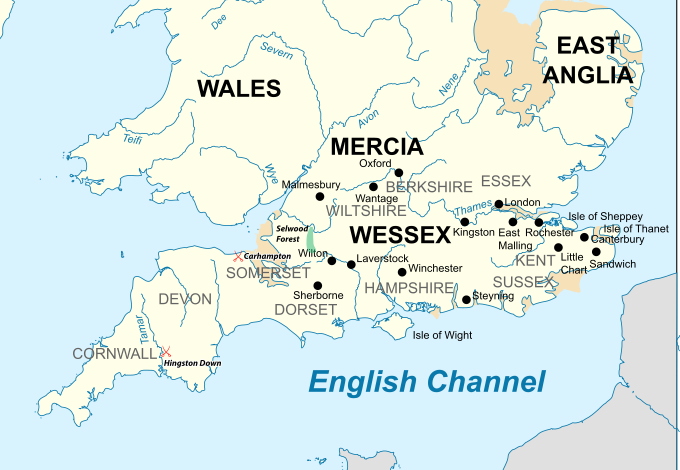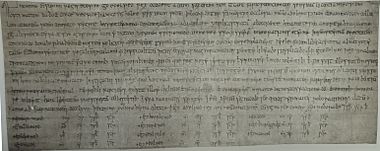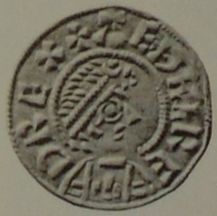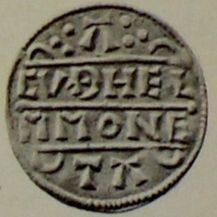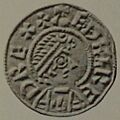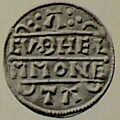Æthelred I of Wessex facts for kids
Quick facts for kids Æthelred I |
|
|---|---|
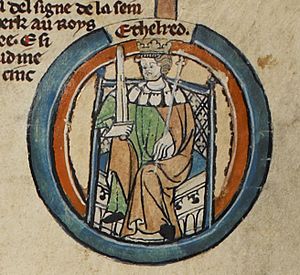
Æthelred as depicted in the early-fourteenth-century Genealogical Roll of the Kings of England
|
|
| King of Wessex | |
| Reign | 865–871 |
| Predecessor | Æthelberht |
| Successor | Alfred |
| Born | 845/848 Wessex, England |
| Died | Late April 871 (aged 23–26) |
| Burial | Wimborne Minster, Dorset |
| Consort | Wulfthryth |
| Issue | |
| House | Wessex |
| Father | Æthelwulf |
| Mother | Osburh |
Æthelred I (also known as Aethelred or Ethelred) was the King of Wessex from 865 until his death in 871. His name, Old English: Æthel-ræd, means "noble counsel" in Old English. He was one of five sons of King Æthelwulf of Wessex. Four of these sons, including Æthelred, became kings.
Æthelred became king after his older brother, Æthelberht. After Æthelred died, his youngest brother, Alfred the Great, became king. Æthelred had two sons, Æthelhelm and Æthelwold. They were too young to become king when their father died. Alfred was later followed by his own son, Edward the Elder. Æthelwold tried to claim the throne from Edward but was not successful.
Æthelred's time as king began when a huge Viking army, called the Great Heathen Army, arrived in England. Over the next five years, the Vikings took over Northumbria and East Anglia. In late 870, they launched a major attack on Wessex. In early 871, Æthelred lost the Battle of Reading. But just four days later, he won a big victory at the Battle of Ashdown. However, this was followed by two more defeats at Basing and Meretun. Æthelred died soon after these battles. Alfred had to pay the Vikings to leave, but he later won a key victory against them at the Battle of Edington.
Æthelred's reign was important for coins. Wessex and Mercia were close allies. Æthelred strengthened this by using a coin design from Mercia. This created a single coin design for southern England for the first time. This shared design hinted at the future unification of England. It also set the stage for later coin reforms by King Edgar.
Contents
Early Life and Family
Æthelred was the fourth of five sons of King Æthelwulf. His mother, Osburh, came from a royal family in Wessex. Historians believe Æthelred was born around 845. His younger brother, Alfred the Great, was born a few years later, around 848.
When Alfred was young, he was sent to Rome by his father. An old record says that Æthelred also went to Rome with Alfred. It is likely that Æthelred received honors from the Pope too. However, later writers focused only on Alfred's visit. This was because Alfred became a very famous king.
Æthelred first appeared in official documents as a "king's son" in 854. He continued to use this title until he became king in 865. He might have even acted as a sub-king for a short time. This would have happened when his older brother, King Æthelberht, was away. There is no sign of any conflict between the brothers.
Becoming King of Wessex
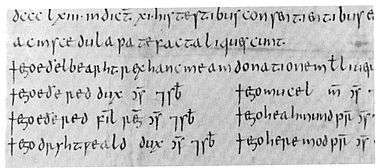
Æthelred became king when his brother Æthelberht died in 865. He married a woman named Wulfthryth. Not much is known about queens in Wessex during this time. They usually did not have the title of regina (queen).
However, Wulfthryth was called Wulfthryth regina in one document. This suggests she had a higher status than other kings' wives. Æthelred and Wulfthryth had two known sons: Æthelhelm and Æthelwold.
King Æthelwulf, Æthelred's father, had left property to three of his sons: Æthelbald, Æthelred, and Alfred. The plan was for the longest-living brother to inherit everything. When Æthelbald died, Æthelred and Alfred were still young. They agreed to let their share be managed by their brother, King Æthelberht. He promised to return it to them later.
When Æthelred became king, Alfred asked for his share of the property. Æthelred said it was too hard to divide. He promised to leave everything to Alfred when he died. This disagreement suggests that the brothers might not have always been on good terms.
Battles Against the Vikings
The way Vikings attacked England changed when Æthelred became king. Before, there were small raids. Now, a huge Viking army arrived, aiming to conquer and settle. This army was known as the Great Heathen Army.
Viking Army Arrives
In 865, the Great Heathen Army landed in East Anglia. The local king paid them to leave, and they stayed for a year. Then, they marched north and conquered Northumbria. They put their own king in charge there. In 867, they took Nottingham in Mercia.
Æthelred's brother-in-law, King Burgred of Mercia, asked for help. Æthelred and Alfred led a large West Saxon army to Nottingham. They surrounded the Vikings, but the Vikings stayed safe inside the town's defenses. The combined armies could not break through. Eventually, Burgred paid the Vikings to leave. They then went back to York.
Attacks on Wessex
In 869, the Vikings returned to East Anglia and conquered it, killing King Edmund. In December 870, they launched a full attack on Wessex. They were led by Kings Bagsecg and Halfdan. They took over Reading around December 28.
Three days later, the Vikings sent out a group to find food. This group was defeated by a local army led by Æthelwulf. Four days after that, around January 4, 871, Æthelred and Alfred brought the main West Saxon army to Reading. They attacked the Danes in the Battle of Reading. The West Saxons fought their way to the town. But the Vikings burst out and defeated them. Æthelwulf was killed in this battle.
Victory at Ashdown
Four days later, around January 8, the armies met again at the Battle of Ashdown. The exact location is not known. The Vikings arrived first and took the high ground, which gave them an advantage. They split their forces into two groups: one led by their kings and one by their earls. The West Saxons copied this plan. Æthelred faced the Viking kings, and Alfred faced the earls.
King Æthelred went to his tent to pray before the battle. Alfred led his forces to the battlefield. Both sides formed strong shield walls. Alfred decided to attack, even though Æthelred was still praying. The battle was fierce, but the West Saxons finally won. The Vikings suffered heavy losses, including King Bagsecg and five of their earls.
Later Defeats
The victory at Ashdown did not last long. Two weeks later, Æthelred and Alfred were defeated at Basing in the Battle of Basing. There was a two-month break in fighting. Then, the West Saxons and Vikings met again at a place called Meretun. In the battle on March 22, the Vikings again split their forces. The West Saxons fought well for most of the day. But the Vikings regrouped and eventually won the battle. Many important West Saxon leaders were killed, including Heahmund, the Bishop of Sherborne.
Coinage During His Reign
In the 800s, the only coin made in southern England was the silver penny. Æthelred's time as king was very important for the development of English coins.
At first, his coins looked similar to those of his brother, Æthelberht. But Æthelred soon changed the design. He adopted the "Lunettes" design used by his brother-in-law, King Burgred of Mercia. This was a big step. For the first time, there was a common coin design across southern England.
Historians and coin experts say this change was very important. It showed a growing partnership between Mercia and Wessex. This partnership eventually led to the creation of a unified England. The shared coin design created a kind of money system across southern England. This helped connect the economies of the two kingdoms. It also supported their military alliance against the Vikings.
Most of Æthelred's coins were made with the Lunettes design. They were usually made in Canterbury, with some also made in London. The coins were well-made and consistent in their design.
Death and What Happened Next
Æthelred died shortly after Easter in 871. He had ruled the kingdom for five years, facing many challenges. He was buried at the royal church in Wimborne in Dorset.
While Alfred was at Æthelred's funeral, the West Saxons lost another battle at Reading. Alfred himself was then defeated at Wilton. He had to pay the Vikings to leave, and they went to London. In 876, the Vikings returned. Alfred fought a guerrilla war until he won a major victory at the Battle of Edington in 878.
Æthelred had two young sons. If he had lived longer, Alfred might never have become king. But because his sons were still children, Alfred took the throne. Æthelhelm died before Alfred. Æthelwold later tried to claim the throne from Alfred's son, Edward the Elder, after Alfred died in 899. One of the places where Æthelwold started his rebellion was Wimborne. This was important because it was his father's burial place.
Æthelred's descendants played a significant role in governing England in the late 900s and early 1000s. For example, Ealdorman Æthelweard, a historian, was Æthelred's great-great-grandson.
See Also
- Alfred the Great
- House of Wessex
- Viking Age
Images for kids
 | Janet Taylor Pickett |
 | Synthia Saint James |
 | Howardena Pindell |
 | Faith Ringgold |


